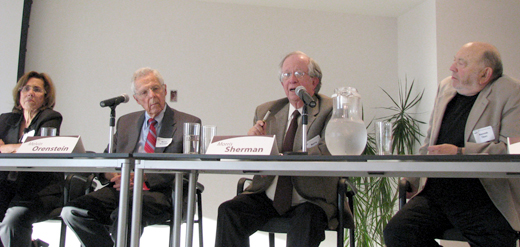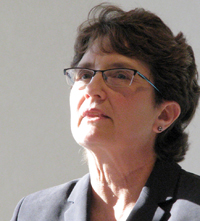
By MORDECAI SPECKTOR
A panel of noted Jewish lawyers recently reflected on their legal experiences during a period of social and political change in America.
The May 27 program, titled “Personal Perspectives of the Twin Cities Jewish Lawyer Experience in the Last Half Century,” was created by the Jewish Historical Society of the Upper Midwest and sponsored by the Twin Cities Cardozo Society, an affinity group for Jewish attorneys, judges and law students. The Cardozo Society is affiliated with the United Jewish Fund and Council of St. Paul and the Minneapolis Jewish Federation.
Several dozen Cardozo Society members and guests attended the event, which was hosted by Fredrikson & Byron, P.A., in its downtown Minneapolis office.
The panelists were Judge Roberta Levy, a Philadelphia native who was appointed to the Hennepin County court by Gov. Rudy Perpich in 1978; Melvin Orenstein, who was with Lindquist and Vennum, and received the Cardozo Society’s Sidney Barrows Lifetime Commitment Award in 2008; Morris Sherman, senior counsel to Leonard, Street and Deinard; and Kenneth Tilsen, a veteran of the Robins firm in St. Paul, and the dean of civil rights lawyers in Minnesota.
Helen Rubenstein, a staff attorney with the Public Health Law Center at William Mitchell College of Law in St. Paul, moderated the discussion. Rubenstein has conducted oral interviews with the panelists (and with Arthur Weisberg, who participated in the discussion via prerecorded video) for the Jewish Lawyers Project. These interviews with lawyers who entered practice after World War II have been archived by the Jewish Historical Society of the Upper Midwest.

The discussion started with Rubenstein asking the panelists why they decided to become lawyers. Morris Sherman explained that he welcomed the opportunity to work with Amos and Ben Deinard, the sons of Rabbi Samuel N. Deinard (a native of Lithuania who founded the American Jewish World). Leonard, Street and Deinard, in 1961, had nine lawyers and eight of them were Jews, according to Sherman, and the Deinards were held in high esteem by their fellow lawyers and among Jews.
Ken Tilsen, who was the lone lawyer on the panel from the St. Paul side of the river, managed the St. Paul office of the firm then known as Robins, Davis & Lyons. In 1951, it was “Solly and me,” Tilsen recalled, in reference to the firm’s co-founder, the late Solly Robins, and the St. Paul office. Tilsen, who left the firm in 1966, recalled that his colleagues in St. Paul enjoyed a friendly, “club-like” atmosphere in their dealings with one another.
Melvin Orenstein was hired by Vennum, Newhall, Ackman & Goetz, which eventually merged with another firm and became Lindquist and Vennum. He mentioned the formation of the Minnesota Client Security Fund and Board, which was established to safeguard clients’ funds, as one of the highlights of his career.
Judge Levy attended the U of M Law School and joined Robins, Davis & Lyons after graduation. She later worked for the Minnesota Public Defenders Office, then went to the Maslon firm in the early 1970s. She recalled the late ’50s and early ’60s as “a different era,” when two women couldn’t get a table at the Oak Grill in Dayton’s in Minneapolis. Also, she mentioned that women were not allowed to enter the Minneapolis Club through the front door.
Levy also recalled that Gov. Perpich had considered her for a Supreme Court appointment, but was concerned about “whether a Jew could get elected,” when she would later have to run in a statewide race for her seat on the bench. Regarding a question about the highlights of her career, Levy mentioned being president of the Talmud Torah of Minneapolis.
In his response to the question about career highlights, Tilsen focused on his work for the Wounded Knee Legal Defense Committee, which coordinated legal representation for American Indians charged with crimes following the 1973 American Indian Movement takeover and government siege of the famed village on the Pine Ridge Indian Reservation in South Dakota. That involvement deeply influenced his life and that of his family, including a son who still lives in western South Dakota; Tilsen mentioned that he has grandchildren who are members of the Oglala Sioux tribe.
Morris Sherman cited the Jewish value of justice, which was reflected in his firm’s efforts to hire members of racial minority groups and women, in answering the question about career highlights. And in regard to Rubenstein’s question about advice for a young lawyer, he counseled that becoming wealthy should not be one’s ultimate goal. “Be a fine craftsman,” said Sherman, regarding the practice of law. He also suggested that community service was an important part of the profession, and mentioned Allen Saeks, his colleague at the Leonard, Street and Deinard firm, whom he called a “paragon” of service to the bar, and to the Jewish community and the greater community. (Full disclosure: Saeks is a partner in Minnesota Jewish Media, LLC, the parent company of the American Jewish World.)




















Comments 0